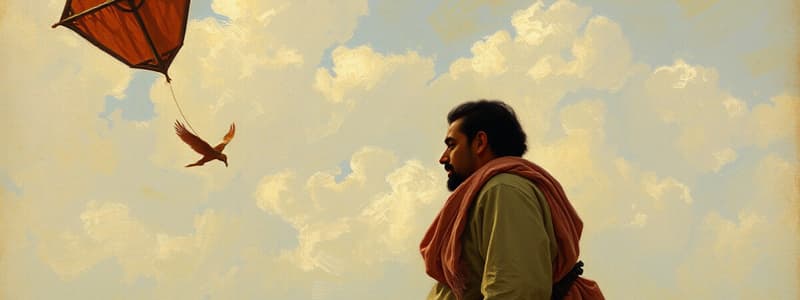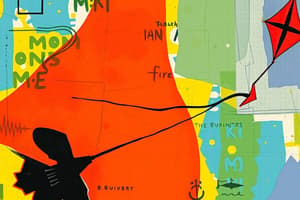Podcast
Questions and Answers
What quote describes Hassan's distinctive Hazara features?
What quote describes Hassan's distinctive Hazara features?
Like a Chinese doll chiselled from hardwood: his flat and broad nose and slanting, narrow eyes
What quote shows Hassan is submissive to Amir as he asserts his power and influence over him?
What quote shows Hassan is submissive to Amir as he asserts his power and influence over him?
But if I asked, really asked, he wouldn't deny me. Hassan never denied me anything
What quote shows Hassan's loyalty to Amir as he protects him from the consequences of his actions?
What quote shows Hassan's loyalty to Amir as he protects him from the consequences of his actions?
Never told that the mirror, like shooting walnuts at the neighbour's dog was always my idea
What quote shows Amir's wealth and the vast resources available to him?
What quote shows Amir's wealth and the vast resources available to him?
What quote shows that Amir's father's priorities are elsewhere as he disregards his son?
What quote shows that Amir's father's priorities are elsewhere as he disregards his son?
What quote alludes to Amir feeling closer to Khan than his father, showing the distance between them?
What quote alludes to Amir feeling closer to Khan than his father, showing the distance between them?
What quote symbolizes Hassan being hidden away by society due to his status as a Hazara?
What quote symbolizes Hassan being hidden away by society due to his status as a Hazara?
What quote shows how Hassan is disadvantaged by society by his social class, he is confined to a particular way of life?
What quote shows how Hassan is disadvantaged by society by his social class, he is confined to a particular way of life?
What quote contrasts Amir's luxurious lifestyle compared to Hassan's poor and simplistic living?
What quote contrasts Amir's luxurious lifestyle compared to Hassan's poor and simplistic living?
What quote contrasts the two boys' mothers, as Amir's mother died a virtuous death while giving life and Hassan's mother disgraced society?
What quote contrasts the two boys' mothers, as Amir's mother died a virtuous death while giving life and Hassan's mother disgraced society?
What quote shows Hassan is discriminated and defined by his ethnicity?
What quote shows Hassan is discriminated and defined by his ethnicity?
What quote shows Amir comforting Hassan after the incident involving the soldiers?
What quote shows Amir comforting Hassan after the incident involving the soldiers?
What quote shows Amir's unkindness as he laughs at the expense of Ali's suffering?
What quote shows Amir's unkindness as he laughs at the expense of Ali's suffering?
What quote shows the oppression of the Hazara is continued by the education system, which neglects their personal history and existence?
What quote shows the oppression of the Hazara is continued by the education system, which neglects their personal history and existence?
What quote shows Ali's submissiveness, showing Hassan mirrors Ali's temperament?
What quote shows Ali's submissiveness, showing Hassan mirrors Ali's temperament?
What quote is ironic as Amir is unable to see the differences between himself and Hassan?
What quote is ironic as Amir is unable to see the differences between himself and Hassan?
What quote introduces the narrator's name and reveals the significant impact of Amir on Hassan's life?
What quote introduces the narrator's name and reveals the significant impact of Amir on Hassan's life?
Study Notes
Character Distinctions
- Hassan is depicted with distinctive Hazara features, described metaphorically as "Like a Chinese doll chiselled from hardwood" highlighting his unique physical appearance.
- His loyalty is evident as he is portrayed as submissive to Amir, with the quote illustrating Hassan's unwavering dedication: "But if I asked, really asked, he wouldn't deny me."
Social Class and Status
- Amir’s wealth is underscored by the acknowledgment of his father's affluent status and the luxurious home in Kabul's Wazir Akbar Khan district.
- The stark contrast between Amir's affluent lifestyle and Hassan's modest living is emphasized through descriptions of their respective living conditions.
Family Dynamics and Relationships
- Amir's relationship with his father shows emotional distance, as indicated by his father's neglect: "He'd close the door, leave me to wonder why it was always grown-ups' time with him."
- A deep connection is revealed through Amir’s feelings towards Rahim Khan, showing a closeness with him that he lacks with his father.
Ethnicity and Discrimination
- Hassan's status as a Hazara subjects him to societal discrimination, depicted in the quote "You! The Hazara!" which captures the prejudice he faces.
- The narrative reveals the systemic oppression of the Hazara through the educational system, which neglects their history, indicating a broader societal issue.
Maternal Contrast
- The contrast between Amir’s and Hassan’s mothers illustrates differing societal perceptions; Amir’s mother is remembered for her virtuous death, while Hassan’s mother is deemed disgraceful for abandoning her child.
Emotional Moments and Interactions
- A poignant moment occurs when Amir comforts Hassan after a traumatic encounter with soldiers, highlighting their emotional bond despite societal differences.
- Amir's unkindness is reflected when he humorously mocks Ali's suffering, showcasing his moral conflicts and insensitivity.
Shared Childhood
- The irony of Amir's obliviousness to his and Hassan’s differences is depicted in their shared experiences, such as breastfeeding and playing in the same yard, revealing the complexity of their relationship.
Significant Poignant Revelations
- The quote "His was Amir. My name" signifies the deep impact and interconnection between Amir and Hassan, suggesting that their identities and fates are intertwined despite societal divisions.
Studying That Suits You
Use AI to generate personalized quizzes and flashcards to suit your learning preferences.
Description
Test your knowledge of Chapter 2 of 'The Kite Runner' with these flashcards. Explore key quotes that highlight character relationships and distinct features. Perfect for anyone looking to deepen their understanding of this poignant novel.




